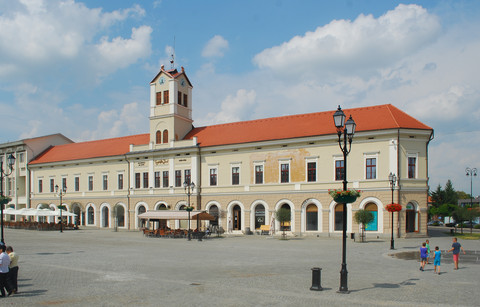[ad_1]

The Romanian city of Sfântu Gheoghe plans to bridge the language gap between Hungarian and Romanian speakers by pioneering a programme to incentivise learning each other’s languages.
Located in the historic region of Transylvania, in central Romania, the majority of the city’s inhabitants are Hungarians.
Following the 2011 census, 41,233 (74 percent) of the city’s 56,006 residents classed themselves as ethnic Hungarians, 11,807 (21 percent) as Romanians, with the remaining citizens belonging to other ethnicities.
Antal Arpad, the mayor of Sfântu Gheoghe, said during a recent press conference that city hall will award 1,000 scholarships worth around €200 each to Romanians and Hungarians who want to take part in the language learning programme.
Speaking to EUobserver, Arpad said that the idea for a language learning programme, to help end the communication barrier that exists in Sfântu Gheorghe, started to take shape a few years back following a local essay contest.
“The winners of that competition were taken on a visit to Bucharest to see the parliament building. In the bus kids from the same school, from the same city, some speaking Romanian and others Hungarian, had to communicate in English in order to understand each other. That prompted me to come up with a solution.”
The mayor said that the local branch of the Babes-Bolyai University will be hosting the language lessons which are aimed at both students and people who return to the city after completing their studies in other cities or countries.
Students will take a test at the beginning and at end of the programme. Financial support from Sfântu Gheorghe City Hall will be conditional on working towards bettering language skills, Arpad explained.
“We can’t afford to throw money out the window. Students will have to advance by at least one level in their language proficiency in order to benefit from the scholarship.”
Teaching Romanian to ethnic Hungarians and Hungarian to ethnic Romanians will bring the community closer together and reap economic benefits as well, mayor Antal Arpad hopes.
“I met many Romanian and Hungarian speakers who have trouble finding work in this region, in the Szeklerland area, because they can’t speak each other’s language. This is particularly true when seeking work in the service sector and in bed-and-breakfast units. This is also an issue particularly amongst youngsters and student returning to the city and I believe this programme will have a very positive impact on the local economy.”
The one million Romanian Leu [€205,000] scholarship programme is expected to kick start registration in early April after the local budget has been approved.
Finnish example
The mayor recounted for EUobserver an experience he had while visiting Finland.
In Finland, the official languages are Finnish and Swedish, the latter being the native language of about 5.2 per cent of the population.
“I remember asking someone there what motivated them towards having bilingualism embedded so well in local affairs. That person responded that it doesn’t bother them at all, but helps the Swedes greatly.”
According to Arpad, news of programme had a positive reception in the community as many people see the benefits of learning another foreign language.
Officials from other multiethnic cities in Transylvania also reacted positively to Arpad’s initiative.
Speaking to EUobserver, Istvan Vákár, vice-president of Cluj County Council commended Arpad’s initiative. Vakar said that at his county level there is a language programme carried out by the Cluj County Library but resorting only to teaching Hungarian to Romanian speakers but not the other way around.
The programme has been in place for several years, and enjoyed positive response from the community, according to Vakar.
Cluj Country has a 16 percent Hungarian ethnic population and 80 percent ethnic Romanians.
Another representative from the region, Csaba Borboly, leader of Harghita County Council told EUobserver that “it is important that students belonging to the Hungarian minority learn Romanian”.
He also said that each year, Harghita County Council finances NGOs’ holding programmes and language camps teaching Romanian and Hungarian language through special methods to kids and youngsters.
Separate from the welcomed language learning initiative, mayo Arpad ran into some controversy last year after flying only the Hungarian flag in downtown Sfântu Gheoghe, without the Romanian flag as provided by law.
He was fined 10,000 Romanian Leu.
[ad_2]
Source link